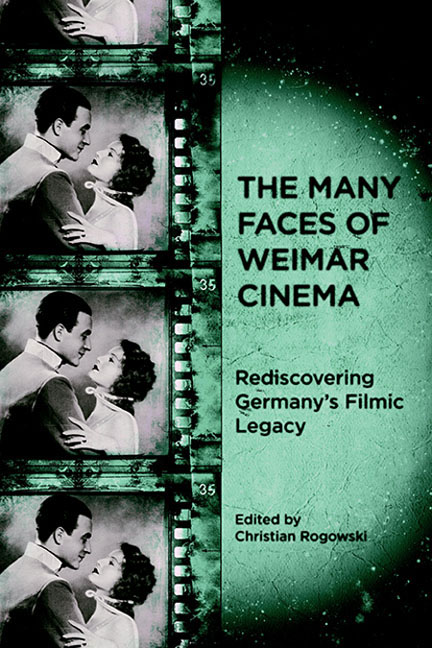Book contents
- Frontmatter
- Contents
- List of Illustrations
- Preface
- Introduction: Images and Imaginaries
- 1 Richard Oswald and the Social Hygiene Film: Promoting Public Health or Promiscuity?
- 2 Unsettling Nerves: Investigating War Trauma in Robert Reinert's Nerven (1919)
- 3 Humanity Unleashed: Anti-Bolshevism as Popular Culture in Early Weimar Cinema
- 4 Desire versus Despotism: The Politics of Sumurun (1920), Ernst Lubitsch's “Oriental” Fantasy
- 5 Romeo with Sidelocks: Jewish-Gentile Romance in E. A. Dupont's Das alte Gesetz (1923) and Other Early Weimar Assimilation Films
- 6 “These Hands Are Not My Hands”: War Trauma and Masculinity in Crisis in Robert Wiene's Orlacs Hände (1924)
- 7 The Star System in Weimar Cinema
- 8 Schaulust: Sexuality and Trauma in Conrad Veidt's Masculine Masquerades
- 9 The Musical Promise of Abstract Film
- 10 The International Project of National(ist) Film: Franz Osten in India
- 11 The Body in Time: Wilhelm Prager's Wege zu Kraft und Schönheit (1925)
- 12 Henrik Galeen's Alraune (1927): The Vamp and The Root of Horror
- 13 The Dialectic of (Sexual) Enlightenment: Wilhelm Dieterle's Geschlecht in Fesseln (1928)
- 14 Babel's Business — On Ufa's Multiple Language Film Versions, 1929–1933
- 15 “A New Era of Peace and Understanding”: The Integration of Sound Film into German Popular Cinema, 1929–1932
- 16 Landscapes of Death: Space and the Mobilization Genre in G. W. Pabst's Westfront 1918 (1930)
- 17 Undermining Babel: Victor Trivas's Niemandsland (1931)
- 18 Unmasking Brigitte Helm and Marlene Dietrich: The Vamp in German Romantic Comedies (1930–33)
- Filmography
- Notes on the Contributors
- Index
15 - “A New Era of Peace and Understanding”: The Integration of Sound Film into German Popular Cinema, 1929–1932
Published online by Cambridge University Press: 29 April 2017
- Frontmatter
- Contents
- List of Illustrations
- Preface
- Introduction: Images and Imaginaries
- 1 Richard Oswald and the Social Hygiene Film: Promoting Public Health or Promiscuity?
- 2 Unsettling Nerves: Investigating War Trauma in Robert Reinert's Nerven (1919)
- 3 Humanity Unleashed: Anti-Bolshevism as Popular Culture in Early Weimar Cinema
- 4 Desire versus Despotism: The Politics of Sumurun (1920), Ernst Lubitsch's “Oriental” Fantasy
- 5 Romeo with Sidelocks: Jewish-Gentile Romance in E. A. Dupont's Das alte Gesetz (1923) and Other Early Weimar Assimilation Films
- 6 “These Hands Are Not My Hands”: War Trauma and Masculinity in Crisis in Robert Wiene's Orlacs Hände (1924)
- 7 The Star System in Weimar Cinema
- 8 Schaulust: Sexuality and Trauma in Conrad Veidt's Masculine Masquerades
- 9 The Musical Promise of Abstract Film
- 10 The International Project of National(ist) Film: Franz Osten in India
- 11 The Body in Time: Wilhelm Prager's Wege zu Kraft und Schönheit (1925)
- 12 Henrik Galeen's Alraune (1927): The Vamp and The Root of Horror
- 13 The Dialectic of (Sexual) Enlightenment: Wilhelm Dieterle's Geschlecht in Fesseln (1928)
- 14 Babel's Business — On Ufa's Multiple Language Film Versions, 1929–1933
- 15 “A New Era of Peace and Understanding”: The Integration of Sound Film into German Popular Cinema, 1929–1932
- 16 Landscapes of Death: Space and the Mobilization Genre in G. W. Pabst's Westfront 1918 (1930)
- 17 Undermining Babel: Victor Trivas's Niemandsland (1931)
- 18 Unmasking Brigitte Helm and Marlene Dietrich: The Vamp in German Romantic Comedies (1930–33)
- Filmography
- Notes on the Contributors
- Index
Summary
In the late 1920S passionate debates erupted among German artists and critics about the impact of sound on film making. Some feared that the new technology would dictate low artistic standards. Experimental filmmaker Walther Ruttmann, writing in late 1928, bemoaned the end of the era in which “serious people made serious films” (Ruttmann). Other commentators rejected such pessimism and emphasized the new horizons opened by the creative use of sound. Inventive director Ewald André Dupont, for instance, predicted that the new technology would fundamentally enrich cinematic expression and would guarantee it a prominent place among the “respectable” arts. The “appropriate” use of the new cinematic tools, he maintained, would bind the German filmmakers with the renowned national lineage of “poets and philosophers” (Dupont).
Many critics noted that the importance of sound-recording technology in film extended beyond the narrow debate on artistic values into the social and political arena. In January 1929 the film journal Film-Kurier rang in the New Year with a special editorial declaring sound film a symbol and a vanguard of a new, cosmopolitan stage in the progress of humanity: “The sound film is marching in and it brings along a new era of peace and understanding for all cultured nations” (Aussenberg). The ability to document reality comprehensively later prompted the Film-Kurier to hail sound film as a veritable “gift to humanity” (Meissner).
Germany's historical trajectory in the following years coincided, of course, with the most ominous epoch in German history, the demise of the Weimar Republic and the rise of the National Socialist regime (Blasius). The years 1929 to 1933 brought not only the implementation of sound film in German studios and theaters but also the collapse of Hermann Müller's government (March 1930), the “Prussian Coup” (July 1932), and the appointment of Adolf Hitler as the German chancellor (January 1933). The final years of the Weimar Republic were a time of “total crisis,” when “the real question […] was no longer whether the republican constitutional system could be saved or restored; it was what would come in its stead” (Peukert, 249).
- Type
- Chapter
- Information
- The Many Faces of Weimar CinemaRediscovering Germany's Filmic Legacy, pp. 249 - 267Publisher: Boydell & BrewerPrint publication year: 2010

